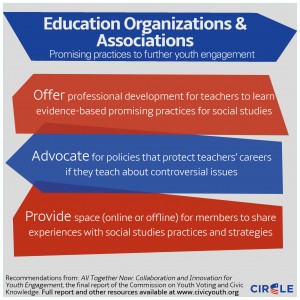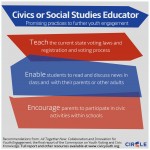Commission on Youth Voting and Civic Knowledge
Commission on Youth Voting and Civic Knowledge
What is the Commission? | What is the Report | How to Use this Report | Sharing This Report | Why this Commission Now? | What Did the Commission Focus On | Who is on the Commission?
CIRCLE formed a distinguished, nonpartisan, scholarly commission that investigated rigorous data on young Americans’ civic knowledge and voting, and then issued recommendations for how to improve both. The commission was formed in response to controversies about recent voting laws (for instance, the new state photo ID laws) as well as debates about civic education in schools and colleges. It, however, took a broader view, considering a wide range of potential influences on political knowledge and engagement. The commission began with no position on the existing or proposed policies; its deliberations were heavily influenced by new data collected during and immediately after the 2012 election.
After interviewing stakeholders, and surveying thousands of young people and hundreds of teachers, the Commission on Youth Voting and Civic Knowledge released its report “All Together Now: Collaboration and Innovation for Youth Engagement” (October 2013).
The result is a detailed yet wide-ranging look at the current state of civic education, informed voting, and political engagement of the nation’s youth. The report highlights some of the Commission’s previously released findings, presents brand-new findings that further shed light on these issues, and makes a compelling case that strengthening youth participation will require concerted efforts from every corner of our society.
To go along with the report, CIRCLE will be providing materials to help stakeholders reflect on and use the information therein. As “All Together Now” proposes, a wide range of people and groups must come together to have a significant effect on youth voting and civic knowledge. These people and groups work in schools, election offices, civic learning coalitions, community-based organizations, statehouses, and other places. We’ve created resources to use within and across these settings.
« How Civic Leaders Can Use the Report
« How Education Associations Can Use the Report
« Individual Reflection Guide for Teachers
Graphics | Sample Tweets | Sample Facebook Posts | Sample Announcement
 |
 |
 |
Today @Civicyouth released “All Together Now: Collaboration & Innovation for Youth Engagement” w/data-driven recs http://bit.ly/19xF62j
Inequality of civic opportunities among youth major challenge to participation, says @Civicyouth in major report: http://bit.ly/19xF62j
Govt #Shutdown an example of what makes #CivicEd challenging. Also opportunity to teach new generation to be civil http://bit.ly/19xF62j
New @Civicyouth report says to significantly increase youth political engagement will need many to collaborate http://bit.ly/19xF62j
“Every generation needs civic education. Yong people do not automatically acquire the skills, knowledge, motivations and values necessary to contribute to the republic; they must be educated and encouraged” – CIRCLE’s Commission on Youth Voting & Civic Knowledge http://archive.civicyouth.org/?p=5915
Should states mandate courses and tests for civics? See what the CIRCLE’s Commission on Youth Voting and Civic Knowledge has learned in this new groundbreaking report. http://archive.civicyouth.org/?p=5915
“All Together Now: Collaboration and Innovation for Youth Engagement” is a new, data-driven report from CIRCLE (Center for Information and Research on Civic Learning & Engagement), whose scholarly research informs policy and practice for healthier youth development and a better democracy. The report is the final product of the distinguished and scholarly Commission on Youth Voting and Civic Knowledge, which CIRCLE brought together to take a broad view and consider a wide range of potential influences on political knowledge and engagement. The result is a detailed yet wide-ranging look at the current state of civic education, informed voting, and political engagement of the nation’s youth. The report makes a compelling case that strengthening youth participation will require concerted efforts from every corner of our society.
Youth political engagement requires attention. Forty-five percent of young people age 18-29 voted in 2012, down from 51% in 2008. The roughly half of young Americans who do not vote are consistently poorer and less educated than their peers who do vote.
In addition, states differ dramatically in youth turnout, with some frequently seeing twice the voting rates of others. States affect their own young citizens’ political engagement with a wide range of voting laws and by enacting policies for civic education in public schools. Along with the states, the federal government, local governments, and major institutions such as universities make decisions that affect young people’s knowledge and attitudes related to politics and their voting.
What Did the Commission Focus On?
To investigate the full range of influences on informed youth voting, CIRCLE organized and staffed a scholarly, nonpartisan commission. The commission was funded by the S.D. Bechtel, Jr. Foundation, the W.T. Grant Foundation, the Robert R. McCormick Foundation, the Spencer Foundation, and the Youth Engagement Fund. To inform the Commission’s deliberations, CIRCLE conducted the following major, original research:
- CIRCLE conducted a nationally representative online survey of 1,695 youth (ages 18-29) in June/July 2012 and 1,109 of the same youth between in October 2012.
- Immediately after the election, CIRCLE surveyed 4,483 individuals (ages 18-24) by cell phone and land-line phones. At least 75 participants came from each of the 50 states and Washington DC (75-131 per state) to allow us to estimate the effects of state policies using a statistical model. Participants of Black and Hispanic backgrounds were slightly oversampled.
- In May and June 2013, CIRCLE surveyed a national sample of high school government and social studies teachers. We collected 720 complete teacher responses.
- CIRCLE interviewed 15 stakeholders (nonprofit leaders and advocates, including young adults) and coded and summarized their ideas.
- CIRCLE analyzed National Exit Poll and the Census November Current Population Supplement data to calculate youth turnout and to examine relationships between turnout and laws at the state level.
- CIRCLE conducted a full scan of all the states’ civic education policies and a separate scan of their teacher certification requirements.
The members of the Commission are among the most distinguished scholarly experts on civic engagement and related topics, representing diverse disciplines and institutions. In alphabetical order, the commissioners were:
- Lisa García Bedolla, Associate Professor of Language and Literacy, Society and Culture, University of California Berkeley School of Education
- David Campbell, Professor of Political Science at the University of Notre Dame and director of the Rooney Center for the Study of American Democracy
- Constance Flanagan, Professor, Department of Interdisciplinary Studies, University of Wisconsin-Madison
- Trey Grayson, Director of the Institute of Politics at Harvard and former Secretary of State of Kentucky
- Eitan Hersh, Assistant Professor of Political Science at Yale University
- Diana Hess, Senior Vice President, the Spencer Foundation, and Professor of Education, University of Wisconsin.
- Joseph Kahne, Professor of Education at Mills College and Chair of the MacArthur Foundation Research Network on Youth and Participatory Politics
- Alex Keyssar, Matthew W. Stirling Jr. Professor of History and Social Policy at the Harvard Kennedy School
- Michael McDevitt, Professor of Journalism and Mass Communication, University of Colorado at Boulder
- Richard G. Niemi, Don Alonzo Watson Professor of Political Science, University of Rochester
- Eric Plutzer, Professor of Political Science, Penn State University
- Debra Satz, Marta Sutton Weeks Professor of Ethics in Society, and Professor of Philosophy, Stanford University
- Ismail K. White, Assistant Professor of Political Science, Ohio State University




